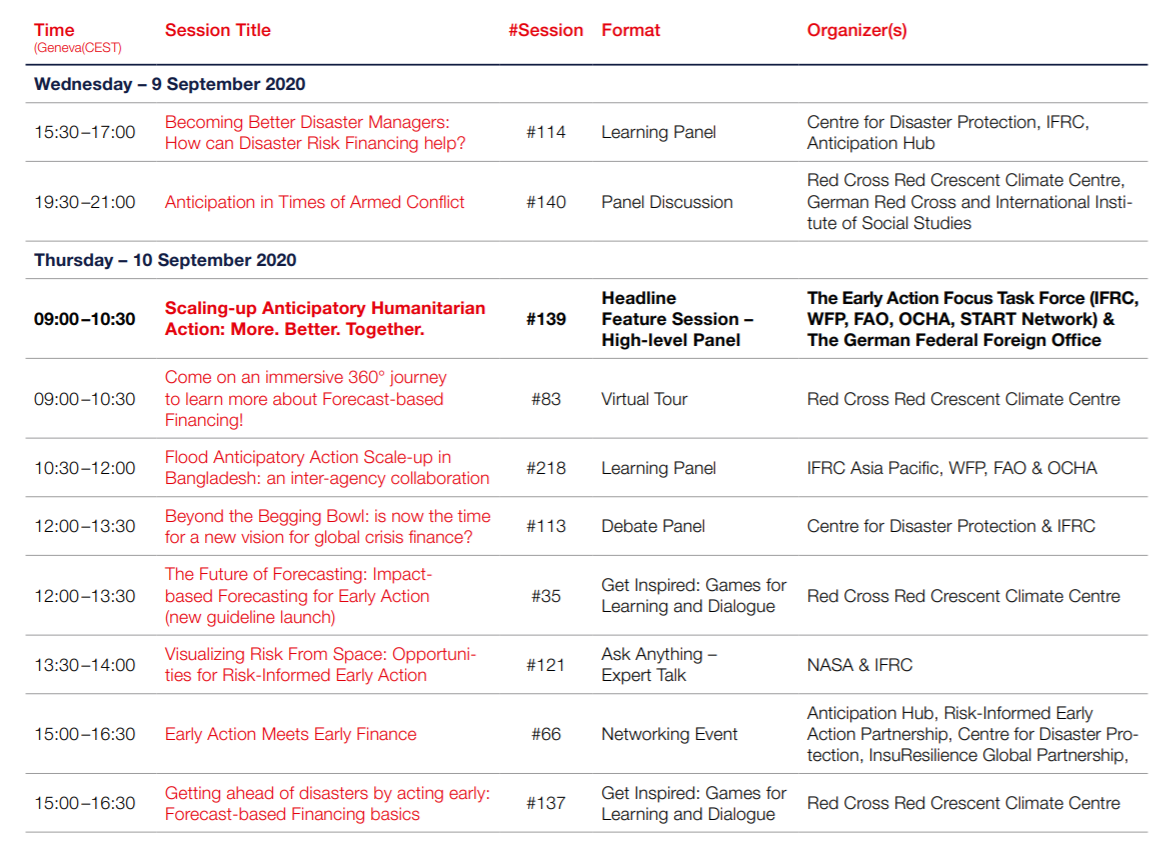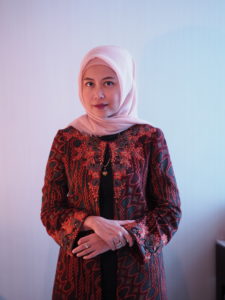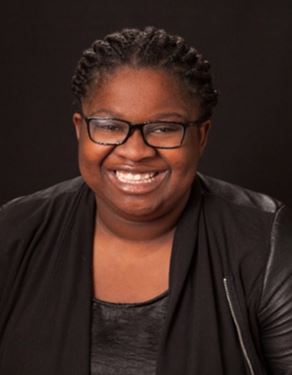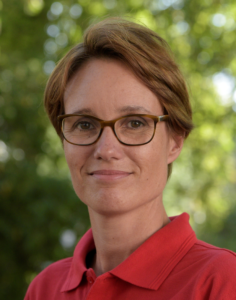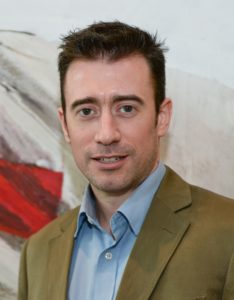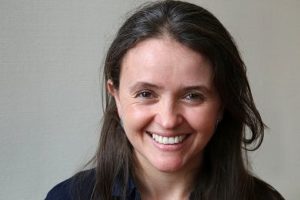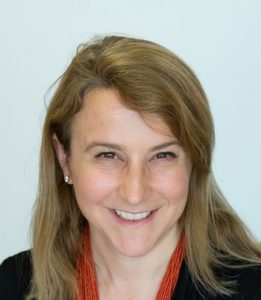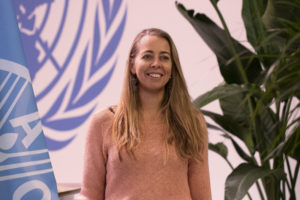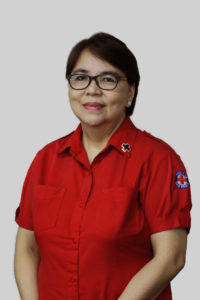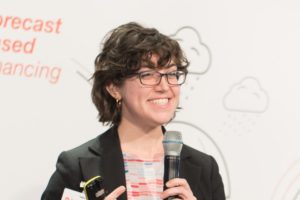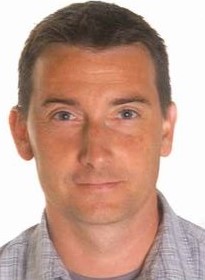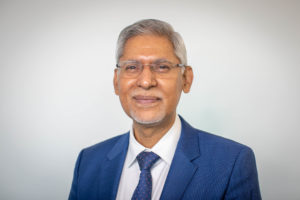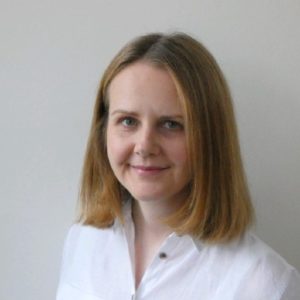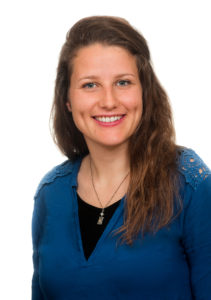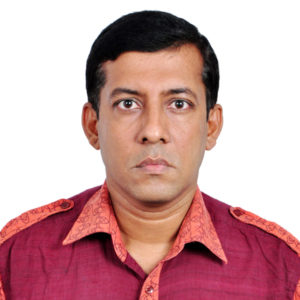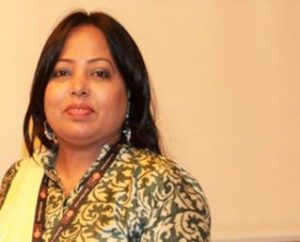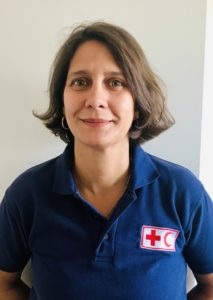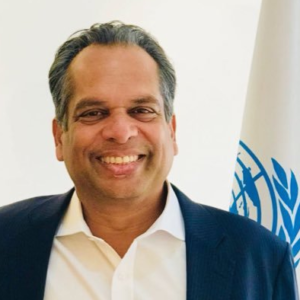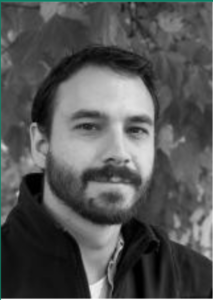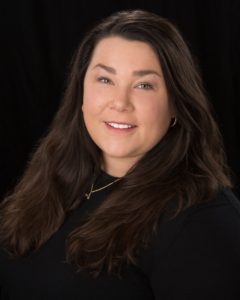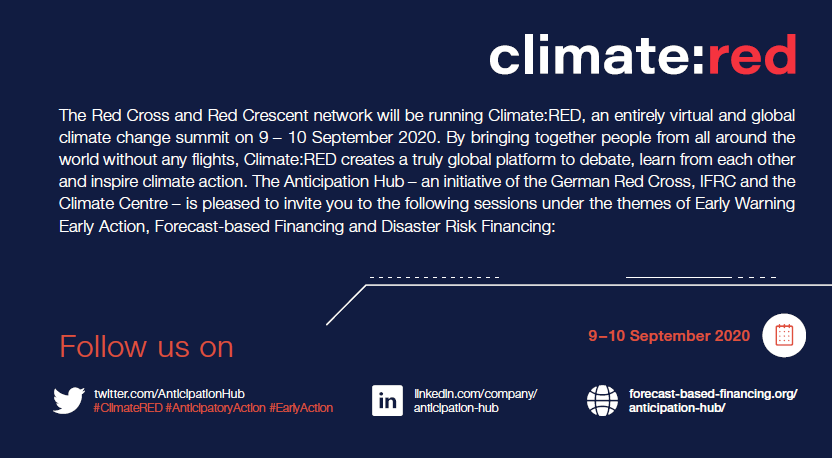Climate:RED Virtual Summit 2020
Find out more about the Climate:RED Virtual Summit
The Red Cross and Red Crescent network will be running Climate:RED, an entirely virtual and global climate change summit on 9 – 10 September 2020. By bringing together people from all around the world without any flights, Climate:Red creates a truly global platform to debate, learn from each other and inspire climate action.
To register
Join us in this session at the virtual #ClimateRED Summit on 9-10 September by registering here.
Our sessions at the Climate:RED Virtual Summit
The Anticipation Hub – an initiative of the German Red Cross, IFRC and the Climate Centre – is pleased to invite you to the following sessions under the themes of Early Warning Early Action, Forecast-based Financing and Disaster Risk Financing:
Get to know our speakers
Adelina Kamal is currently the Executive Director of the ASEAN Coordinating Centre for Humanitarian Assistance on disaster management (AHA Centre), based in Jakarta, Indonesia. She has served as the Executive Director since August 2017, reporting directly to the Governing Board that consists of the Heads of National Disaster Management Organisations of the ten ASEAN Member States. Before the appointment, she was the Deputy Executive Director from November to December 2016, and Acting Executive Director from January to August 2017.
As the Executive Director, Adelina is responsible for leading the Centre in operationalising the ASEAN Declaration on One ASEAN One Response, and implementing the ASEAN’s vision to become the global leader on disaster management by 2025. The AHA Centre is the operational coordination engine of the ASEAN Agreement on Disaster Management and Emergency Response (AADMER), which is the legally-binding policy of ASEAN in disaster management. The AHA Centre was established in November 2011 through the ASEAN Agreement on the Establishment of the AHA Centre.
Prior to working with the AHA Centre, Adelina served for more than 20 years in the ASEAN Secretariat. Her last position was Director for Sustainable Development. Before that, she was the Head of Disaster Management and Humanitarian Assistance Division of the ASEAN Secretariat for seven years. Prior to that, she handled transboundary haze pollution portfolio, and was involved in the development and negotiation of the ASEAN Agreement on Transboundary Haze Pollution.
Aramide Odutayo is a gender, health, humanitarian, and development specialist with extensive programmatic, advocacy, research, and policy experience in the field of women’s and girl’s empowerment and adolescent and youth sexual and reproductive health and rights (SRHR). Currently, she is a Programme Officer with the Adolescent and Youth Unit of the United Nations Population Fund (UNFPA) Cox’s Bazar Sub-Office where she leads UNFPA emergency and humanitarian-development-peace nexus programming for adolescent and youth in Bangladesh. Aramide has also had the pleasure of working with CARE Canada, the International Development Research Centre of the Canadian Federal Government, and the UNFPA Liaison Office to the African Union (AU) and the Economic Commission for Africa (ECA) in Addis Ababa, Ethiopia. Aramide holds a Masters degree in Global Governance from the Balsillie School of International Affairs, University of Waterloo, Canada and a Bachelors of Arts in Political Science from the University of Western Ontario, Canada.
Alexandra Rüth is Head of the Anticipation Hub, currently being set up by the German Red Cross the International Federation of Red Cross and Red Crescent Societies and Red Cross Red Crescent Climate Centre. Alexandra has 15 years of experience in the humanitarian and development sector and has been working for the German Red Cross since almost 8 years. Previously, she led the project group on Forecast-based Financing which developed one of the first anticipatory approaches for the humanitarian system.
Alexandra worked in Latin America, Central-Asia and Africa and has a profound knowledge of the humanitarian system in general and more specifically on Food Security, Disaster Risk Reduction and Anticipatory Action. Her core interests are innovative approaches in the humanitarian world, agility in team management, participation of stakeholder groups and female leadership.
Alexandra holds a MSc in Agricultural Science and a post-graduate on International Cooperation for Sustainable Development (SLE) of the Humboldt-University in Berlin.
Ben Webster has worked in the humanitarian sector since 2003 and within the Red Cross & Red Crescent Movement since 2012. He has worked in emergency contexts in Africa, Asia, MENA and the Caribbean and held roles such as Head of Emergencies at the British Red Cross and has most recently been leading their work on climate change adaptation & early action. Ben will be interim Head of Secretariat for the Risk-informed Early Action Partnership and is passionate about improving anticipatory humanitarian action for the communities most affected by disasters and crisis.
Catalina coordinates the strategic development of the forecast-based financing concept worldwide, as well as providing technical support for the design and implementation of FbF projects by National Societies. Catalina is the knowledge manager of the Science for Humanitarian Emergencies & Resilience (SHEAR) programme and is currently PhD researcher at the University of Twente on Early Warning and Early Action in conflict-affected settings. She has 16 years’ experience in the humanitarian sector. Her main areas of expertise are Disaster Risk Reduction, Climate Change Adaptation, Early Warning and Early Action. Her background is in Industrial Engineering with a Masters in International Humanitarian Action.
Christina Bennett is CEO of the Start Network, which is developing new funding instruments that enable humanitarians to mobilise collaboratively, predictably, to manage risks rather than react to crises. Christina has 20 years of experience in humanitarian policy and practice, including field work in Afghanistan, Pakistan and South Sudan. Previously, Christina was head of the Humanitarian Policy Group (HPG) at the Overseas Development Institute, where she led research on local humanitarian action, humanitarian reform and disaster management and drove policy initiatives related to counter-terrorism, protection of civilians, refugee livelihoods and private finance. Prior to joining HPG, Christina was the Chief of Policy Analysis and Innovation at the United Nations Office for the Coordination of Humanitarian Affairs (OCHA) and Head of Communications at the Afghanistan Research and Evaluation Unit in Kabul. Christina is a frequent writer and speaker on conflict and humanitarian aid. In 2019, she was part of a United States bi-partisan Senate task force on humanitarian access. Her work has appeared in The New York Times, Reuters, BBC World Service, TIME, The Economist Intelligence Unit, The New Humanitarian and Devex.
Catherine-Lune Grayson joined the ICRC as a Policy Advisor in 2016. She focuses on the experience of populations affected by armed conflict and violence and humanitarian practices, notably in the context of migration, internal displacement and climate change. Previously Catherine-Lune has worked in East and Central Africa for several years for the Danish Refugee Council, the United Nations Office for the Coordination of Humanitarian Affairs and the United Nations High Commissioner for Refugees. She is trained in Political Science (Sciences Po, Paris) and International Law (Université de Montreal), and holds a Ph.D in anthropology (Université de Montreal).
Dr. Daniel Clarke leads a team of inspiring people at the Centre for Disaster Protection, finding better ways to stop disasters devastating lives. Daniel is an actuary and development economist. He has worked with more than forty developing country governments on disaster risk finance in close collaboration with bilateral and multilateral development institutions, and the private insurance and reinsurance industry. An influential voice in the field of disaster risk finance, Daniel’s publications include the book Dull Disasters? How planning ahead will make a difference (Oxford University Press), co-authored with Professor Stefan Dercon. He has a first class degree from Cambridge University in Mathematics in Computer Science and a D.Phil. in Economics from the University of Oxford, and is a Fellow of the Institute of Actuaries.
Deirdre has 10 years’ innovative financing experience in the non-profit sector, following her earlier career in investment management. She has expertise in climate and disaster risk financing (DRF), having led multi-stakeholder development and humanitarian programs for large INGOs and their private sector, government and donor partners.
Deirdre works as a Senior Consultant for The Centre, with a focus on capacity building and training, including technical assistance on DRF. She holds an MSc in Investment Management from City’s Business School (formerly Cass Business School) and a BA (Hons) in American History from University College London.
Dervla Cleary has almost 20 years of professional experience with the Food and Agriculture Organization of the United Nations (FAO) in a range of roles. Since 2017, she has been leading advocacy efforts on food security, the critical importance of early warning early action/anticipatory action and resilience building to address and avert food crises. Prior to that she worked for over 10 years in advocacy and outreach for Eastern and Southern Africa, including on communication in major crisis events like the 2012 famine in Somalia and the response to the outbreak of conflict in South Sudan.
She has an MA in International Conflict Analysis and a BA in Sociology and Social Policy.
Elizabeth S. Zavalla currently serves as the Secretary General (SG) of the Philippine Red Cross (PRC), responsible for the management, administration, and operations of PRC. She oversees all PRC activities and its regular and special programs.
Before being appointed as Secretary General, SG Zavalla was the Assistant Secretary General (ASG) for Program Development and Services since 2014. She ensures the efficient management of PRC programs and service delivery to the most vulnerable families affected by disasters and emergencies. Known for multi-tasking, she also coordinates PRC’s special projects. Prior to being ASG, she was Head of Special Projects of the Office of the Chairman from 2010-2014.
Before joining PRC, SG Zavalla had a long history of public service. She started her career as Economist for the Olongapo City Planning and Development Office (1980-1981) and later became its Acting CPDC (1983-1984) and finally, full-pledged Coordinator (1985-1986 and 1988-2004). SG also served as a volunteer staff of Richard J. Gordon when the latter became Chairman of the Subic Bay Metropolitan Authority (1992-2008). She also actively participated in hosting preparations for the 1996 APEC Summit in Subic Bay. From 1995 to 2004, she was appointed as Acting City Administrator, in concurrent capacity, assisting in the coordination of the work of all the departments under the direction of the Chief Executive. In 2004, SG Zavalla served as Director for the Office of Senator Gordon and handled the development and social projects of the office and did coordination works with various agencies and individuals as necessary.
SG Zavalla continues to steer the program development of PRC services particularly in the areas of Blood, Safety, Disaster Management, Health, WASH, Welfare, Volunteer Services, and Red Cross Youth. With the PRC Tower, PRC’s acquisition of its Humanitarian Ship-the M/V PRC Amazing Grace, 150 ambulance units, vehicles, heavy equipment, sophisticated tools, chapter buildings and warehouses all over the country, SG Zavalla’s role expands along with her responsibilities. In relation to the “Big One” as well as other man-made and natural disasters, she is fully aware of PRC’s evolving role in augmentation to government operations vis-à-vis earthquakes, fires, floods, and clearing needs.
SG Zavalla graduated with a Bachelor of Science in Business Administration from the University of the Philippines in Diliman, Quezon City, where she also took Master of Arts in Urban and Regional Planning.
Dr. Erin Coughlan de Perez is the manager of the climate science team at the Red Cross / Red Crescent Climate Centre and an adjunct at Columbia University. She is an author for the upcoming 6th Assessment Report of the IPCC. Erin’s work links statistics of extreme climate events with thresholds for preventative action in the humanitarian and development sectors, particularly in the development of innovative Forecast-based financing systems in more than 20 countries around the world.
Gernot Laganda is leading the climate and disaster risk reduction work at the United Nations World Food Programme (WFP). He joined WFP from the International Fund for Agricultural Development (IFAD), where he managed the world’s largest climate change adaptation program for smallholder farmers in developing countries. A geoscientist by training, Gernot has spent the past 20 years managing projects and programs at the intersection of rural development, disaster risk management and climate change adaptation. He held posts with an Austrian NGO supporting disaster relief and reconstruction projects in Afghanistan and Tajikistan; the Austrian Development Agency – a bilateral aid agency in his native Austria; and the United Nations Development Program (UNDP) in South Africa and the Regional Center for Asia/Pacific. Gernot holds a M.Eng. degree in Applied Geosciences, a MA degree in Public Policy, and postgraduate diplomas in disaster management and development cooperation. He is a 2016 Greenberg World Fellow at Yale University
Mr. Jagan Chapagain is the Secretary General of the International Federation of Red Cross and Red Crescent Societies (IFRC). He took up this role on 1 February 2020 and is based in Geneva, Switzerland. Mr Chapagain has extensive experience and a broad knowledge of the International Red Cross and Red Crescent Movement, having begun his career as a youth volunteer at the Nepal Red Cross, advocating for and representing community voices. He has spent more than 20 years with IFRC, working across Europe and Asia. Prior to becoming Secretary General, Mr Chapagain was the Under Secretary General for Programmes and Operations, Chief of Staff and Director of the Asia Pacific region where he provided leadership in responding to large-scale humanitarian crises and in building resilient communities in partnership with National Red Cross and Red Crescent Societies and external partners across the region.
Joanne has joined the Centre as Lead Actuary on secondment from the Government Actuary’s Department (GAD).
At GAD, Joanne led the knowledge and education workstream and was heavily involved in work to mitigate technical and professional risks in the organisation. Prior to this, she worked as a consultant in both the private and public sectors using her actuarial skills to advise clients in managing their financial risks.
Joanne is leading the Centre’s capacity building programme as well as bringing her financial experience to a work across the Centre’s goals.
Joanne has a BA in Industrial Economics from Nottingham University, a Post Graduate Certificate in Education, and is a Fellow of the Institute of Actuaries.
Jurg Wilbrink joined the Red Cross as a GIS and Information management coordinator in 2017 through 510 – The Netherlands Red Cross. Thereafter he worked in Malawi to evaluate and facilitate the data preparedness capacities of the Malawi Red Cross Society in the light of DRR & anticipatory action. Thereafter he worked for two years in Uganda as a data preparedness delegate for 510 – NLRC and supported Uganda Red Cross Society, Kenya Red Cross Society, and Ethiopia Red Cross Society as technical advisor for data preparedness and Forecast Based Financing as part of the Innovative Approaches to Response Preparedness Project. Currently he works at the International Federation of the Red Cross as part of the Southern Africa Country Cluster based in Pretoria – providing technical support to the Southern Africa national societies implementing or embarking on their FbF/IBF journey.
Kara Siahaan has over 14 years of experience in technical assistance, programme management, advocacy and partnership for governments, development agencies, the UN and the Red Cross Red Crescent network in the areas of disaster response, disaster risk reduction and climate change adaptation. Prior to joining IFRC, Kara advised governments in Southeast Asia on disaster displacement issues as the Nansen Initiative Adviser assigned to the German Government and the International Organization for Migration. Kara leads the anticipatory action and disaster risk financing global work at IFRC and coordinates the forecast-based financing work in over 30 countries. She co-led the development of the Forecast-based Action by the Disaster Relief Emergency Fund, a global funding mechanism to enable predictable funding for local Red Cross / Red Crescent to implement early action ahead of disasters. Kara has a Master’s degree in Urban Development and International Cooperation from Technische Universität Darmstadt and Institut d’urbanisme de Grenoble.
Liesa is the thematic manager for Disaster Risk Reduction (DRR) in fragile contexts at the German Red Cross.
She is working closely with GRC delegations in different countries, among others Myanmar, the Philippines, Lebanon, Palestine, Somalia and Mozambique, besides focusing on research and strategic development as well as advocacy and policy dialogues.
Her background is in Political Sciences (B.A.) and Integrated Water Resources Management (M.Sc.) with extensive experience in development and humanitarian programming in fragile and conflict affected settings. Liesa’s main areas of expertise are in DRR, Climate Change Adaptation, national and transboundary water management and stakeholder engagement and participation.
Mr. Mohammad Shahjahan is a development professional with 13+ years’ experience in the international and national organization in humanitarian aid, disaster risk management, climate change and emergency response sector. Currently, he is working as a project coordinator for the Forecast based Financing (FbF) project under the Disaster Risk Management Department of Bangladesh Red Crescent Society supported by the German Red Cross and Red Cross Red Crescent Climate Centre. He is working with FbF since the beginning of FbF concept in Bangladesh.
He has experience for preparation or Early Action Protocol (EAP), simulation and activation of EAPs for Cyclone and Flood Hazards in Bangladesh. He is skilled in strategic planning, resource mobilization (fundraising), strengthening programs/projects, report writing, budgeting, supervising, coordination and effectively leading teams. Currently, he is residing in Bangladesh. He also worked with residence in Philippines and Nepal. He has significant expertise in learning and technical capacity building, programme/project planning, inter-agency coordination, cooperation, implementation, emergency deployment, contingency planning, emergency assessment, vulnerability and capacity assessment and national surge capacity management in humanitarian settings.
Murshida Akhter currently serves a Humanitarian Specialist for United Nations Population Fund ( UNFPA) Bangladesh since 2017 and contributing to ensure that every pregnancy is wanted, every birth is safe, every young person is free of HIV/AIDS, and every girl and woman is treated with dignity and respect even in humanitarian situation.
Murshida has spent the past 20 years in managing and coordinating humanitarian preparedness and response projects and programs, inter-agency coordination, liaison and networking with national government and other national and international humanitarian actors and she has enormous contribution in humanitarian sector in Bangladesh including Rohingya Refugee crisis. She has substantial knowledge and experience on accountability standards in humanitarian actions, Integrated Sexual Reproductive Health and Gender Based Violence in humanitarian context, Cash Based Programing, humanitarian program designing and implementation.
Prior to working with UNFPA, she held various leadership positions in UNICEF, UNDP, OXFAM, Save The Children and Care Bangladesh exclusively in humanitarian and disaster risk reduction sector.
Murshida hold MSS degree in Political Science and Master degree in Disaster Management from BRAC University.
Nazira Lacayo: Professional with 10+ years of experience in program management, disaster preparedness and early action. Joined the Red Cross Movement back in 2014 as Program Coordinator for the IFRC Americas Regional Office. Currently works as Senior Officer for the IFRC Forecast based Action Fund in Geneva.
Niger Dil Nahar is the Programme Policy Officer at the United Nations World Food Programme. Her portfolio includes the design and implantation of the Forecast based Financing/Anticipatory Action approach as a part of the Resilience Innovation Programme WFP Bangladesh. She has 17 years’ experience in the humanitarian sector. Niger earned her M.Sc in Geography and Environment and Post Graduate Diploma in Disaster Management from the University of Dhaka.
Mr. Ramesh Rajasingham is the Acting Assistant Secretary-General for Humanitarian Affairs and Deputy Emergency Relief Coordinator in the United Nations Office for the Coordination of Humanitarian Affairs (OCHA). Before beginning this role in March 2020, Mr. Rajasingham served as Director of OCHA’s Coordination Division since September 2018. Mr. Rajasingham’s career in the field of humanitarian affairs and with the United Nations system spans over 25 years, and includes assignments in Headquarters as well as in crisis settings, with OCHA and UNICEF. Most recently, he served as Deputy Humanitarian Coordinator for the Syria Crisis. Prior to that, he held such senior appointments as the Director of the Secretariat of the Secretary-General’s High-level Panel on the Global Response to Health Crises and OCHA’s Head of Office in the occupied Palestinian territory. His other field assignments also include Afghanistan, Iran, Montenegro, Bosnia Herzegovina and Sudan. At Headquarters, he has served in various capacities in the response, protection and policy activities.
Originally from Sri Lanka, Mr. Rajasingham is an economist trained in the United Kingdom and the United States of America. He and his wife are parents to two children.
Rodrigo Mena is a researcher and international consultant on humanitarian aid, disaster risk reduction (DRR) and disaster response, with 15 years working with governments, (I)NGOs, and the United Nations. In addition to being a university academic, he has led research and humanitarian response to disasters, including work in conflict-affected scenarios like Afghanistan, South Sudan or Yemen. Rodrigo is Board Member of the Int. Humanitarian Studies Association (IHSA) and coordinator of the Peace and Ecology (PEA) commission of the Int. Peace Studies Association (IPRA). He currently works at the International Institute of Social Studies (ISS) of the Erasmus University of Rotterdam, The Netherlands.
Dr. Shanna N. McClain is the NASA Earth Science Divisions Global Partnerships Manager and the Applied Sciences Advisor on Risk Reduction and Resilience. Shanna drives innovation and science with partners including Mercy Corps, Conservation International, Google, and Microsoft. She also works to define NASA’s role in resilience through the development of applications-based programming that identifies opportunities to integrate Earth observation data into humanitarian action, and bolster science-informed decision making.
She previously worked for the Joint UN Environment/UN OCHA Environment Unit, focused on the integration of environmental
Dr. Thomas Zahneisen currently serves as Director for Humanitarian Assistance. Before he was Head of Division on Crisis Prevention, Stabilisation, Peacebuilding, Mediation after being Head of Task Force Afghanistan – Pakistan (2014 – 2015) and Deputy Director of Policy Planning (2012 – 2014) in the German Foreign Office. He worked extensively on the region: as Civilian Commander of the German Provincial Reconstruction Team in Feyzabad in North East Afghanistan, as Deputy Head of the Afghanistan Pakistan Task Force in the Foreign Office, and from 2010 to 2012 as Deputy Ambassador in Kabul. Previous postings include the German Embassy in Rwanda, the German Permanent Mission to the UN in New York, as well as secondments to the French Foreign Ministry Paris, where he served as Deputy Head of the Security Council Affairs Desk in, and to the EU as Diplomatic Advisor to the EUFOR-Mission in Kinshasa (DR Congo).
He holds academic degrees from Philipps University Marburg, École Normale Supérieure in Paris and Harvard University.
Zoë has worked for over 20 years in public finance, disaster risk management, governance, research and evaluation in low-income countries. She has worked with and for many UN agencies, humanitarian organisations, regional development banks, bilateral donors and NGOs. At the Centre for Disaster Protection, Zoë sits in the leadership team and is responsible for leading the Centre’s partnerships with multilateral organisations, including overseeing our quality assurance service.
She has a first class degree in English Literature and a distinction in her Master’s degree in Law in Development from the University of Warwick.
Flyer


